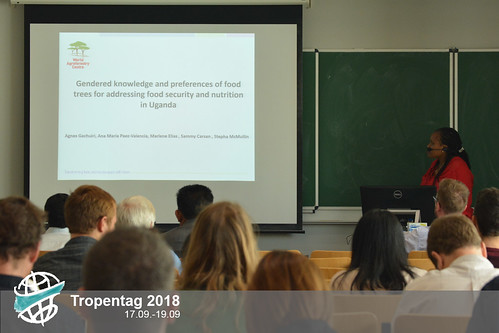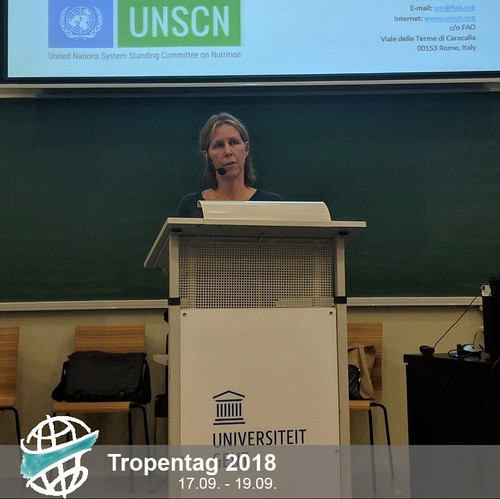Tropentag 2018

Answering the Big Questions on Global Agriculture and Nutrition.
Wed, 09/19/2018 - 15:22 — kehinde odeniyiAnswering big questions is natural to Tropentag, as the 20th edition of her prestigious interdisciplinary conference on tropical and subtropical agriculture kicked off today. Intuitive biodiversity, mythical organic agriculture and the nexus between agriculture, nutrition and health were some of the questions answered by the keynote addresses in this year’s Tropentag.
Redefining Smallholder Agriculture

A Hero
Tue, 09/18/2018 - 19:59 — agyeiIn attendance of this year's Tropentag is the oldest among all other participants, Dr. Rainer Zachmann, a retired German phytopathologist. Earlier on in his research life, he worked for the CIP from the years 1973-1989. With his passion for developing countries, he worked for IITA also as a phytopathologist from 1989 to where he was mobile throughout sub-Saharan African countries including Nigeria, Ghana, Togo, Benin, among others.
Dr. Zachmann did not only work as a researcher in Africa but also availed himself as a trainer on all aspects of most valuable food crops in Africa such as maize, cassava, and yam. During this time, he developed research tours and conducted several workshops with the aim of improving agriculture in Africa. Dr. Zachmann spent close to a decade in Ibadan, Nigeria and due to his friendly manner he was fully integrated in his Nigerian community in Ibadan where he was named "Akinkanju" which literally means "warrior".
During the oral presentation sessions earlier today at the AUD E2, Dr. Zachmann was the fifth to give a presentation. It was obvious that the audience were tired and bored already. In the quest to revive the tired audience, Dr. Zachmann greeted the audience in four different languages which then sparked inspiration in the audience. This indeed justified that there is a true hero in the house.

More drought for better nutrition
Tue, 09/18/2018 - 18:48 — agyeiDuring this afternoon's oral presentation session "soil and soil fertility", a presentation from the project Healthy Land with controversial research title " Do we need more drought for better nutrition? - Water stress on nutrient content of food" was observed. Sahrah Fischers PhD work became center stage for discussion prior to the oral presentation given by Mr. Thomas Hilger in the absence of Sarah Fisher at this year's Tropentag. With such a conrtroversial heading, it wasn't surprising that the AUD E4 was almost filled to capacity with attendants who have been driven to the auditorium to unmask the villain.
Diving deeper into this research work, Mr. Hilger gave a clear introduction to this research by stating reasons why plants are important for human nutrition. Again, he pointed out clearly that with increasing extreme weather events, sudden drought periods can affect plant growth, bioavailability of nutrients and and quality of produced food. This then led to the aim of their study which was conducted in 2016 in two regions in East Africa (Kapchorwa, Uganda and Busia, Kenya) in order to identify whether drought have an impact on the nutrient composition of produced food.
Ebola outbreak: don’t blame only bush meat
Tue, 09/18/2018 - 17:19 — Onu EkpaIn Sierra Leone, Guinea and Liberia, the recent Ebola virus (EBOV) outbreak was devastating and led to more than 10,000 death. But who or what should we blame? - wild, domestic animals or both ...? That is the question Juliet Jabaty from Sierra Leone Agricultural Research Institute tries to find answers to. She agrees that bush animals such as bat and monkey are the major reservoir of EBOV but more animals could be culprit in cases reported. This critical research gap is yet to be filled hence Juliet researched on “The Role of Livestock and Wildlife in the Biology of Ebolaviruses”. She hypothesized that pigs, dogs and some ruminants can serve as reservoir for transmission of EBOV.
Why do women prefer mango?
Tue, 09/18/2018 - 17:00 — huidobroBelieve it or not, there are gender preferences for fruit producing trees! This is what Agnes Gachuri, from the World Agroforestry Center (ICRAF), presented in one of the oral presentation sessions at Tropentag 2018. It is known that the fruit producing trees have an important role in rural livelihoods and food security. But when it comes to which kind of trees to cultivate, the farmers have to make a decision. They are the ones that have local knowledge and prioritize the species cultivation, as well as household use. However, sometimes farmers fail to consider the potential of local varieties due to market demand, lack of seed availability, or knowledge transfer.
Catching the eye of development sectors: Nutrition dances in all the scenarios
Tue, 09/18/2018 - 14:53 — Diana SantosOver the last decade, nutrition became a rising concern across the globe. Not only amongst scientific groups, but mainstream media began to amplify the attention on nutrition, such as the campaign #HungerZero. Nutrition has always been a critical topic, however it is now that people are realizing the essential role of nutrition in human development in all its dimensions, from the basis of health to the economic push-ups of nations.
Africa indigenous vegetables face extinction!
Tue, 09/18/2018 - 14:41 — Onu EkpaKenya like many other African countries faces double nutrition burden – undernutrition and over-nutrition. The former is due to inadequate nutrient intake and the latter could be attributed to changes in lifestyle such as consumption of western food junks coupled with a sedentary lifestyle, paraphrased from Anne Aswani Musotsi’s presentation. Anne is from Jomo Kenyatta University of Agriculture and Technology, Kenya and she presented on – “African Indigenous Vegetables (AIV) Contribution Towards Food Security and Safety in Kenya: A Meal Cultures Perspective”. She mentioned that AIV could ensure nutrition security but unfortunately the consumption is low and many of the vegetables are going into extinction. This is counterintuitive especially in a society with malnutrition and millions of people suffering from avoidable and irreversible nutritional consequences. AIV consumption is very low. Due to changes in cultural practices over the years, people eat other crops and shifted attention from indigenous vegetables – colonial influence paradigm.
Eat egg during pregnancy, get a stupid baby
Tue, 09/18/2018 - 13:44 — Onu EkpaThe title sounds very strange but it is a perception in some regions in Africa including the upper region of Gambia. Taboos during pregnancy are one of the many forms of food taboos present in Africa, influencing consumption pattern and food habit. Therefore, it is imperative to consider the cultural elements of the people in every intervention to ensure optimal impact. This thought was considered in Céline Termote’s research on “Role of Biodiversity in Improving Dietary Diversity and Quality of Complementary Foods for Infants and Young Children in Southern Benin”.






